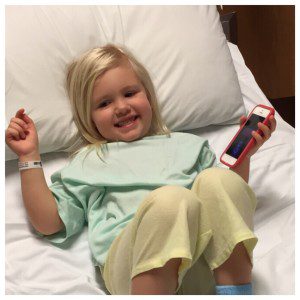You probably won’t remember us, but we will never forget you.
When we walked into the hospital for our three-year-old to undergo a “very routine” procedure, it felt anything but routine for us. While our gregarious, brave toddler announced she was “so excited!” to be at the hospital, we felt immense anxiety. We knew we were in good hands for her adenoid removal and ear tube placement. But we didn’t know just how good until you entered the room.

You told us you were a father; we saw your interest and ease in communicating with our daughter. We watched you entertain her with your stethoscope and laughed along as you joked about your own kids’ favorite songs and TV shows. You welcomed our questions and validated my concerns. When you took my husband and daughter back to the operating room, you sang every word to the Doc McStuffins theme song while placing the “magic mask” on my daughter.
Later you told us that while the surgery went well, there was a complication when you removed our daughter’s breathing tube. Later we would find out that you had only experienced this particular complication about five times in your professional life, but that you prepare for it each time. When her muscles spasms closed her airway, you had the right medicine in your pocket to relax them so she could breathe less than a minute later.
I tried to focus on your words as I rocked my disoriented, wailing child. I heard about half of what you said about the complication. But when I asked if she would be ok, I trusted when you said “yes.” In the flurry of activity, we realized we had more questions. And somehow, in between your next two surgeries you found time to come to the recovery room and answer them. You assured us that ours was a fluke complication, and that our now sleeping child would be ok. The next morning, a Saturday, you called to check on our little one.
There are no words to describe our gratitude for the expert care you gave our daughter, and the amount of compassion you showed our family. We are so grateful that our child is overall healthy, and hope that there are more doctors like you to care for children who need it.
We are forever grateful.













This is touching and I’m so happy you were provided with excellent anesthesia care. I would like you to know though, that it was likely that the anesthesiologist who took care of your child, was actually overseeing multiple surgeries and in fact, a certified registered nurse anesthetist (CRNA) was the person taking care of your child in the operating room. The CRNA was likely the person who put your child to sleep, monitored them while under anesthesia, and had the medication readily available that was required when your child had a laryngospasm upon waking up from anesthesia. Most often, the anesthesiologist isn’t present in the operating room for a majority of the surgery (including wake up) and this is also why he/she was available to see you in the post operative area on multiple occasions. Lay people, not in the medical field, are often not aware of what CRNA’s do and I just wanted you to know that it sounds like your child had excellent care provided by one.
The vast majority of Americans who have had anesthesia were never even touched by an Anesthesiologist. They were carefully and professionally guided through the anesthetic by a CRNA
Jen and Dave,
Why take such a wonderful story of a humanistic touch to medicine and distort it into political nonsense? There are plenty of other websites for that. Shameful.
Falicia – thank you for your wonderful story. I love that this still happens in medicine.
A pediatric anesthesiologist who loves his job,
Kevin
Kevin,
The truth hurts, I guess ?
Sincerely,
CRNAs across the country
This really wasn’t about politics, it’s just simply the truth that most people don’t realize.
Rachel and Holli,
I love the CRNAs that I work with daily. I’m even related to a couple (and I love them too!) :).
The author had a wonderful experience because of an anesthesiologist. Hey, it happens. We can occasionally get it right! To cast a negative shadow on the story is tasteless.
This blog is not the place to argue the merits of one’s profession. That was my only point.
I wish there could be more peace between our professions,
Kevin
I read this story , and what I learned from it .. Bedside manner is everything.
First and foremost , I want to say that I am glad your daughter is ok .
Unfortunately , you are confusing a complication that should have been prevented with good care .
The reason why your child went into spasm was because the anesthesiologist took the tube out too early . His syringes that he ” has ready ” are routine.
Spasm is not an unusual occurrence and is easily treated if discovered early . The fact that he mentioned it , only indicates that this episode was likely longer than the minute he claims .
The fact he saw you several times and called you the next day , was very likely because he was concerned about any long term problem .
Again , glad your perceived experience was good … Even happier that your daughter is ok . But don’t mistake arrogance for exceptional care .
Here, here Kevin!
Susan, assuming you are correct, that laryngospasm “should have been prevented with good care” (you aren’t), what makes you think arrogance was the motivator for any of this anesthesiologist’s actions? If there was a risk of complication after surgery to my child I would expect follow up. I would also expect to be told of that kind of complication no matter how long it lasted. Seems to me he acted in a way I would hope any doctor would in that circumstance, and did it in a way that was reassuring to an anxious parent.
[…] A Letter To Our Daughter’s Anesthesiologist Falicia H. […]
Lovely story! – Physician Pediatric Anesthesiologist
When a child goes into surgery, it is a teamwork approach and many professionals are involved in the care of a child. Many times a parent may not have the chance to meet everyone who was a part of the process. That is not the point of this beautiful letter. It is focusing on the gentle, kind, and informative approach of this anesthesiologist. I loved this letter! Also, laryngospasms can happen due to various reasons and that is one of the unfortunate risks of anesthesia. There is no blame to be had. Thanks for sharing your experience. -Pediatric recovery room nurse
This is a wonderful story, and an example of how all healthcare providers should engage with patients and their families. However, the CRNAs above attempting to diminish the excellent care provided by the anesthesiologist are just sad…